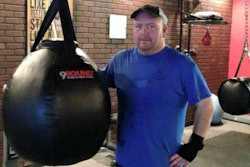The president of the National Association of Small Trucking Companies (NASTC) discussed his organization’s health resources for drivers at the 2016 Mid-America Trucking Show in Louisville last week, including the need for truckers to carry personal health information when they drive.
NASTC oppers sleep apnea screening.David Owen, president of NASTC, said the association offers several health resources for drivers, including a certified medical examiner directory to connect drivers on the road with nearby medical examiners. NASTC also offers sleep apnea screening that can be done overnight, as well as a way to keep a driver’s health history with them as they travel.
“It’s all designed to help our drivers continue to make a living,” Owen said.
During the sleep apnea test, a driver is given a wristwatch-like device to wear overnight. The sleep monitor is then sent to NASTC certified sleep specialist who reads the data. The driver is notified if they have mild sleep apnea, which isn’t seen as a difficulty, or borderline extreme apnea and have a need for further testing.
Owen also discussed NASTC’s Driver Medical Portfolio, which he recommends all drivers keep in their trucks for emergencies. The portfolio includes information about what, if any, medications the driver takes, their medical history and other health details. Even if driver’s don’t use NASTC’s portfolio, Owen said he still recommends drivers keep something similar in their cabs at all times.
“If a guy is on I-20 and he falls asleep and hits a tree and he’s unconscious, and the emergency people get out there and they don’t know who he is, they don’t know what medicines he’s taking, they don’t know what he’s allergic to,” Owen said. “All they can do is put him together, get him on a gurney and try to get him to a hospital. If he had a medical log with him in the truck, it could very well allow those emergency people to save his life right there on the side of the highway.”








